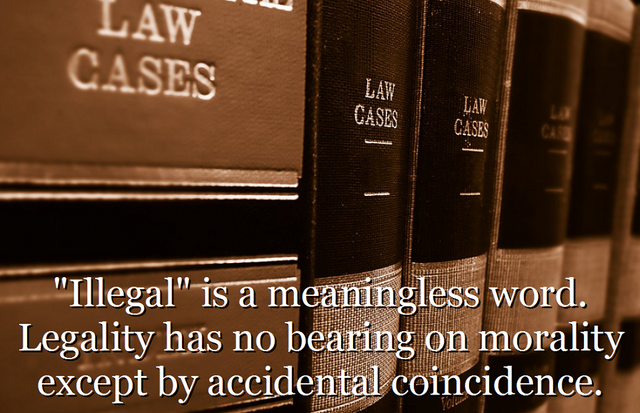"Illegal"? So what?
Pick your hot-button topic, whether immigration, bump stocks, marijuana, home education, concealed carry, raw milk, unlicensed sales, marriage, trade, travel, or anything else. If the primary argument against it is, "that's illegal," the argument is empty and can be disregarded as ignorant prejudice. Crime is only rationally defined by a violation of another's rights, not violation of arbitrary political edicts, because the enforcement of those edicts is often criminal. Don't be confused by the counterfeit dignity and authority of "lawmakers."
Remember, slavery was "legal," and being (or aiding) a runaway slave was "illegal" throughout most of human history. Jim Crow was "the law" in the united states. Alcohol was illegal for a time and other drugs are illegal now. Machine guns are illegal without a tax stamp and other bureaucratic hurdles. Bump stocks and full-capacity magazines are "illegal" now in many jurisdictions. None of these statements carry a single iota of moral or rational legitimacy for enforcing those laws.
Legality alone only defines what other people will use to justify violence against you, and that is the only matter you need to weigh if you are not violating the rights of others. Compliance under duress may be expedient, but never consider it consent

And rights are what you use to justify violence against others. I've long wondered, who gets to define these "rights" and how are they determined?
Perchance, are you familiar with Max Stirner?
I have generally found Stirner to be the refuge of people who want to justify being dicks. I doubt that is his actual philosophical foundation, but that is my impression of his adherents.
Humans use reason to choose actions that will achieve their desired ends. Their reasoning may be flawed, the information they use may be faulty, and their capacity for action may be limited, but the point stands nonetheless. A sound theory of rights defines the equal and reciprocal spheres of authority for all individuals, whether you want to dismiss that as a "spook" or not. Rights cannot justify trespass, and only define where another has committed trespass. Proportionate violence in self-defense against a trespass may be warranted, but this does not justify any initiatory violence or mandate that violence be the first resort.
Would you agree that legality is "a spook" though?
I definitely agree that legality is a "spook" (or probably more accurately, a conceit). My issue is with the whole "sound theory of rights", while I agree in principle with the "do as you please as long as you don't violate the rights of others" its practical application in the real world is where things get messy and I take issue.
The definition of 'rights' has been my hangup every time I attempt to envision how an anarchist society could/would function. Barring the unlikely event of unanimous consent, how does defining rights differ from writing laws? What are rights derived from that grant them their superior authority compared to laws? Are they both not group codes of conduct backed solely by violence?
I'm not trying to be a dick so much as find solutions to questions I've never had satisfactorily answered. I'm fond of Stirner in part because I don't see how they can be satisfactorily answered, although I'd be quite happy to be proven wrong in that regard.